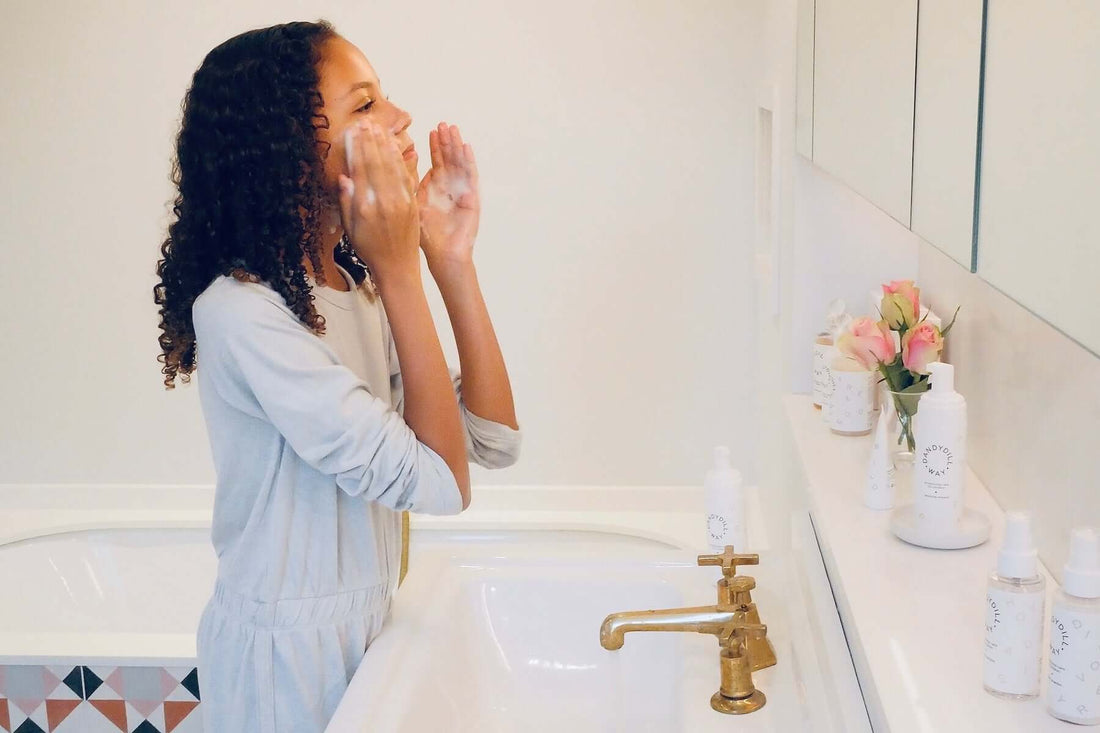
Effective Skin Care Tips for Tweens and Teens
Share
The pre-teen years are a great time to introduce the concept of a skin care routine. Indeed, skincare experts suggest introducing children to skin care around the age of 9 to 11 years old. At this age, they are more capable of understanding the importance of hygiene and following a simple skin care routine. This allows children to develop a consistent habit as well as the know-how to adapt their routine as they grow older and their skin's needs change, thus creating a foundation for lifelong healthy skin practices. But the skincare tweens use in their routine, and indeed all pre-teen skin care products, need to take into consideration that this skin, which is either on the brink of or in the full throttle of adolescence, is more sensitive and delicate compared to adult skin.
Puberty brings about significant changes in a child's skin. As a child embarks on their teenage years, hormonal fluctuations can lead to increased oil production. This excessive build-up of oil coupled with an increase in sweat traps dirt within the skin cells, which can result in clogged pores and acne breakouts. Teaching tweens/pre-teens about skin care equips them with knowledge on how to manage these issues effectively. Additionally, as the frequency of skin cell renewal decreases during adolescence, proper skin care can help maintain a healthy complexion by removing dead skin cells and promoting faster regeneration.
12 Top Tips for Effective Pre-Teen Skin Care
Here are some tips you can share with your child to ensure their skin will look as healthy as possible, whatever life (or genetics!) throws at them.
1. Keep your pre-teen skincare routine simple: The best skincare routine is uncomplicated and consistent. Use a streamlined, sensitive skincare set for children for ultimate convenience. The simplest rule is to follow a simple regimen twice a day - morning and night. Wash your face twice a day - when you wake up and before you go to bed. (It’s easy to remember if you wash at the same time as brushing your teeth.)
2. Avoid soap: This product is not a good choice of cleanser as it is harsh on the skin due to its alkaline nature with high pH levels. Normal healthy skin has pH levels that are slightly acidic, so soaps increase the skin's pH, making it more prone to dryness and irritation by stripping off natural skin oils, compromising the skin barrier function. To wash your face properly, use a soap-free cleanser that does not dry out your skin or cause irritation. Avoid SLS, a surfactant that can be very harsh on sensitive teen skin. Don’t scrub your skin too harshly; instead, use gentle, circular motions, making sure to reach every inch of your face.
3. Avoid ingredients that can irritate: Everyone’s skin is different, but all pre-teens have skin that is more delicate than adults. If your skin is particularly sensitive, finding products that are suitable can be tricky. Look out for products labelled allergen-free and avoid essential oils, particularly citrus oils, which can be highly allergenic. Also avoid artificial colours and fragrances. If you're prone to allergies or skin sensitivity, always test new products before use, ideally for 3-7 days. Apply a small amount of the product to the same area in the same way you'd apply it in normal use, somewhere it won't get rubbed or washed off. The inner side of the elbow is ideal. Leave as long as you would in normal use; if it's a cleanser, a couple of minutes should be fine. No reaction after 7 days means the product is fine for your skin. Usually, an allergic reaction will happen within a few hours.
4. Use lukewarm water to wash the face: When it comes to pre-teen skin care, using all the right products won’t be effective if you’re not using lukewarm water. If you wash your face in water that is too hot, it can strip your skin of the natural hydrating oils, as well as causing a breakdown of delicate tissue, leading to the skin becoming dry and flaky. Avoid washing your face in the shower as the water is often too hot for your face. Water that is too cold can also cause dryness, flakiness and acne as the dirt is not loosened off the skin.
5. Choose non-comedogenic moisturiser: Look out for products, especially moisturisers, that won’t block pores. Jojoba oil mimics natural sebum and is particularly skin compatible and therefore often recommended for acne prone skin. The temptation is to avoid moisturising oily teen skin all together, but the right product will help to balance and protect. A high-quality, fragrance-free moisturiser designed for children and teens will keep the skin pure and soft and protect it from drying out, as well as providing radiance and vitality. Tweens should apply moisturiser twice daily to help keep skin supple and hydrated. Staying consistent with moisturiser will also prevent fine lines and wrinkles from forming in adulthood. Finally, avoid moisturisers with added synthetic fragrances as these can irritate the skin.
6. Use UV protection: Sunscreen is a non-negotiable in your pre-teen skin care routine to protect against skin cancer. To avoid irritating children’s skin, a mineral (physical) sunscreen is the best choice. It is important to avoid allergens (these will be in bold on the ingredients list) and also products containing Oxybenzone as there have been concerns about its long-term use. Zinc Oxide and Titanium Dioxide form a physical barrier to prevent penetration from UV rays and work as soon as they are applied. Make sure the product you choose offers high UVA and UVB protection, at least SPF30. Along with an effective sunscreen, there are many steps you can take to protect children from the sun – for example, if you are going outside, wear long-sleeved shirts and wide-brimmed hats to protect skin from the harmful rays.
7. Exfoliate weekly: To avoid clogged pores, which can lead to acne, tweens should keep skin exfoliated. Look for products that contain clay as it has natural antiseptic, or try to make a homemade scrub by mixing sugar and honey. For those with sensitive skin, mix oatmeal with honey and milk. Crucially, only exfoliate skin once a week to remove the buildup of dead skin cells otherwise you can compromise your skin’s barrier function.
8. Avoid touching, picking, squeezing, scrubbing and using too many products: Over-exfoliating, squeezing spots and pimples, washing your face too frequently and trying lots of new acne treatment products can lead to irritation and more breakouts. This can also trigger allergies and make your skin more sensitive. Encourage children to wash their hands before touching their face. If your teen is experimenting with makeup, remind them to touch up their face with clean hands. Every time you touch your face, you can spread infection, damage your skin tissue, and cause further inflammation. Also, picking at skin introduces bacteria and can cause scarring. The golden rule is to leave pimples alone.
9. If acne is severe see a dermatologist: Even with the best pre-teen skin care routine, it’s normal for spots and blackheads to develop. However, if your acne isn’t improving despite consistently caring properly for your skin or trying over-the-counter treatments, you should seek professional help from a qualified dermatologist. Teens shouldn’t be embarrassed of this, as acne can of course affect your confidence and wellbeing. For moderate to severe acne, you may be prescribed an oral or topical acne medication, such as isotretinoin or hormonal birth control. Only take acne medication under medical supervision.
10. Keep your hair clean: Spots on the forehead and hairline are a sign that excess oil from the scalp is clogging pores, so it is vital that you wash your hair regularly. The advice is the same as for skin; use gentle haircare products designed for children and teens that won't strip the scalp or dry out the hair. If you have oily hair or use oily styling products, you may need to change your sheets and pillowcases more often too.
11. Choose to embrace a healthy lifestyle: Your skin’s health is directly dependent on your body’s overall health, so it is important to exercise, meditate, eat healthily, and drink plenty of water. Not always easy for tired, stressed teenagers, but a healthy diet rich in vegetables, fruit and lean protein will not only improve your mood and overall health, but your skin will reap the benefits too. Forget energy drinks and highly processed snack bars as consuming refined sugar and processed fats can aggravate the skin and trigger conditions and breakouts. Instead, for a sustainable boost that will sharpen your mind and get your skin glowing, drink lots of water and choose a healthy raw snack. Our favourite is almonds soaked overnight in water. Delicious, easy to digest and packed with vitamins, minerals, protein and fibre.
12. Use makeup sparingly: Youthful skin is naturally vibrant and healthy, so instead of relying on cosmetics, you can focus on maintaining a good skincare routine to keep your skin clean, nourished and glowing. By embracing your natural beauty, this will help to boost confidence and self-acceptance. If you do choose to wear makeup on special occasions, do so in moderation and prioritise products that are suitable for your young, delicate skin.
Here is an example of a quick and effective skin care routine that is suitable for younger, more delicate skin.
Morning:
- Wash face with a soap-free cleanser and lukewarm water
- Dab and dry face with a clean, soft washcloth
- Apply a thin layer of non-comedogenic moisturiser
- Apply high-quality sunscreen
Evening:
- Wash face with a soap-free cleanser and lukewarm water to remove sunscreen and/or makeup
- Wash face again with a soap-free cleanser and lukewarm water to clean face
- Once a week, exfoliate skin with a gentle exfoliant
- Dab and dry face with a clean, soft washcloth
- Apply a thin layer of non-comedogenic moisturiser
It is natural for dirt and oil accumulate on the face throughout the day but with a simple skincare routine, you will keep your complexion clear of impurities and your skin looking fresh, healthy and glowing. Keeping this routine quick and simple will encourage your child to stick with it, promoting positive habits and reaping the long-term benefits of consistent skincare.
Young skin requires specialised care and it is important to educate tweens and teens on the proper techniques and products suitable for their age and skin type. By explaining the specific challenges faced by pre-teens during puberty, such as increased sensitivity, oiliness, and the potential for acne breakouts, you can emphasise the importance of gentle and appropriate skin care practices such as the use of mild cleansers, the avoidance of harsh products, and the use moisturisers suitable for their skin type. Finally, nurturing a positive relationship with their skin and using bespoke skin-kind grooming products will ensure adolescents can take both responsibility and pride in their appearance, which in turn will enhance feelings of self-confidence. So why not explore Dandydill Way’s skin and haircare collections and start creating a self-care grooming routine with your child today?

